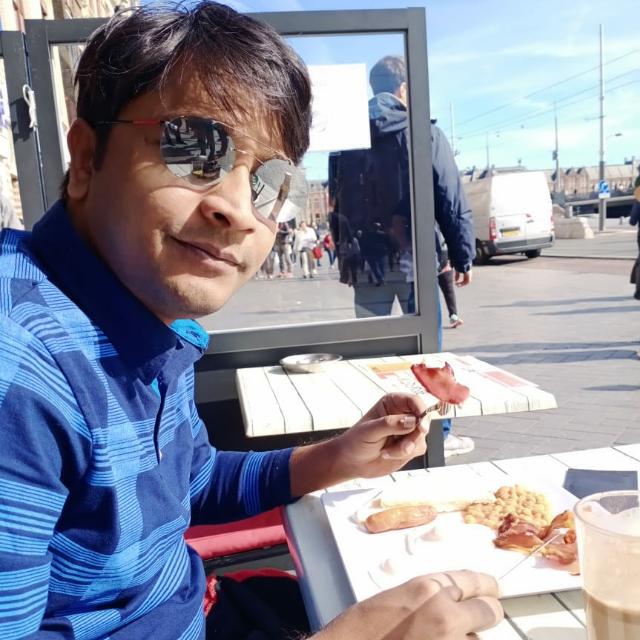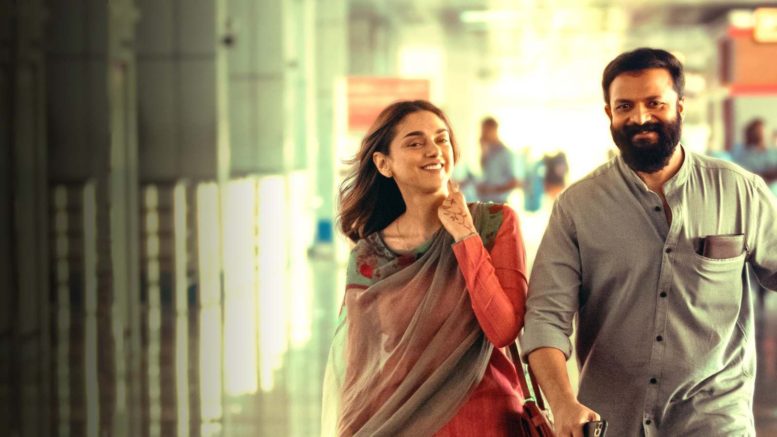Sufiyum Sujatayum is full of religious imagery. It begins at the break of dawn with a mystic looking man entering a run down and dark mosque. He has come by crossing a river ( Moses and the Red Sea??) and performs ‘miracles’ like fixing a flickering lamp , triggering an exodus of believers to the seldom visited mosque through his prayer call and moving the wafer thin plot of the movie forward.
His name is Sufi- the name tells us everything there is to the character. Sufi enters Sujata’s life like a distraction. His prayer call interrupts Sujata’s dance, the same way his entry disrupts Sujatha’s home-dance-music existence. Later, Sufi’s prayer call distracts her when she is looking at her future husband’s photo. He is her alarm that reminds her to escape from reality. The name Sujata means ‘of good family origin’. Sujata is expected to do what girls from “good” families in India are expected to – sacrifice their love stories at the altar of family honor.
Lack of Conviction in the Central Romance
There is a pet bird that Sujatha plays with early in the movie. In a later scene, the bird is shown flying back into its cage and closing the cage-door behind it. Foreshadowing of what Sujatha later does when her father’s hysterical bout makes her walk away from Sufi and back into the house. When Sufi whirls both the bird and Sujata are shown watching his feet, mesmerized. The comparison is further strengthened by a shot of Aboob playing clarinet with the caged bird and Sujata on either side of the frame.

The prayer call is heard throughout the film at crucial junctures. Pay attention to the prayer songs and they could easily pass of as Sufi’s ode of love to Sujata. Sufi’s entry and exit are around the prayer call. Lot of attention seems to have been paid to the sound and music of the film. It works in establishing the ambience of the film. Same goes for the breath-taking visuals of this nameless town and Aditi Rao Hydari.
Stereotypes and Footnote Characters
What lets the movie down is the lack of conviction conveyed through the love story that is the crux of the film. One does not root for this couple like some of the more famous onscreen pairs. They fall in love over a hurriedly put together reel of whirling toes, prayer calls, flimsily constructed sign language and Aboob’s clarinet sound. The love story got the music and lyrics of Sufism right but missed the soul. Also hastily sketched are some of the side characters on whom you can smell stereotype even amidst the aroma from the incense burner.
Aboob whose single solution for everything from love jihad to untouchability to temptations from Satan – is sleep. The character itself seems sleepwalking on a single note through the movie. There is a grave digger who prematurely digs the grave of Sufi-Sujata story but is present more as a footnote through the movie. Sujata’s father takes the conservative dad character and places it at the crossroads of hyperbole and hamming. There is Love Jihad thrown in between all this like a hashtag on a linked in post to attract traffic.
Emotional Scenes and Character Disconnect
In a love story the heavy lifting needs to be done by the lead pair. In this case, Dev Mohan, making his debut, appears to be on a sabbatical from workouts. Aditi Rao Hydari, an otherwise good actress, seems to be on her cheat day. One can see her acting talent in the 2 scenes where she comes to know of the death of close ones. Her expression portrays shades of restraint, grief, shock, loss, break down all in a span of 10 seconds. Barring these scenes, her character does not build the necessary connect.
Jayasuriya brings in his experience and does a fine job in possibly the only well written role in the movie. He plays the role of the husband, a character that has come to be known as ‘The Roy’ post Karthik Dial Seytha Yenn. He is not the sacrificing Ajay Devgan from Hum Dil De Chuke Sanam but an everyday man who just craves a normal married life. You can see that he is not a bad guy, he is just frustrated of living in the shadows of somebody else’s memories. If closure to her wife’s love story is what brings some semblance of normalcy to his marriage, he is ready to fly for the funeral.
Moments, Motifs, and Music Left Hanging
The movie shows the journey of his married life as well, through 2 brief but beautiful ‘wear your seat belt’ scenes. There is a minor but likeable character of the grandma who knows about everything from worker’s rights to Sufism. She tells Sujata about the graveyard that women are not supposed to visit till they die. Then slyly lets in that she has once been there. This in turn hints at an upcoming key moment.
Sufiyum Sujatayum has the moments, the juxtapositions, the motifs, the visuals, and the music. Sadly, they are left hanging, waiting for a congenial plot to elevate.

Captive of the 24 frames and admirer of the written word. If it is not on the silver screen or on the pages of a paperback, it might as well not exist.


The review is a fascinating kaleidoscope of crucial aspects of a movie, the plot and the act. Look forward to more such informative reads on movies that matter!